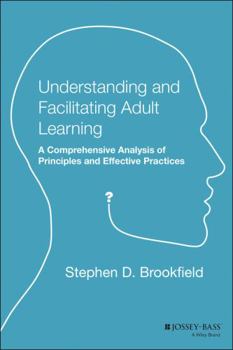Understanding and Facilitating Adult Learning: A Comprehensive Analysis of Principles and Effective Practices (Jossey Bass Higher and Adult Education Series)
Select Format
Select Condition 
Book Overview
1986 Winner of the Imogene Okes Award and the Cyril O. Houle World Award for Literature in Adult Education The first book to receive both the Imogene Okes Award and the Cyril O. Houle World Award for Literature in Adult Education presented by the American Association for Adult and Continuing Education. This book analyzes current approaches to adult learning and presents a comprehensive review of the research on how adults learn.
Format:Paperback
Language:English
ISBN:1555423558
ISBN13:9781555423551
Release Date:September 1991
Publisher:Jossey-Bass
Length:396 Pages
Weight:1.26 lbs.
Dimensions:0.9" x 6.0" x 8.9"
Customer Reviews
2 ratings
Understanding and Facilitating Adult Learning
Published by Thriftbooks.com User , 24 years ago
A thoroughly researched and extensively documented book which efficiently outlines 20 years of studies on adult learning. Effective adulte learning practices are explained in from six categories, voluntary engagement,respect among participants, collaboration and negaotiation of needs, relective praxis, critical appreciation of diversity, and student empowerment of self improvement. Aside from the institutional mode of learning, external authority, set objectives, set teaching roles, prescribed evaluation, adult learning seeks to empower self directed learners with critical thinking modes. This latter kind of learning is not without risk. The risks of dillusion, professional incompetence, and the perils of playing close to a kind of classroom therapy. Nonetheless, adult students bring a wealth of experience (good and bad), maturity, problem posing, problem solving, and task focus to adult learning. Finally, adult learning will invariably be restricted by institutional contexts, evalution criteria, and contextual business norms.
This is a seminal work in Adult Education
Published by Thriftbooks.com User , 25 years ago
I found this work anything but dry. It does present a balance of the theoretical and practical--so if you're looking for a cookbook of training techniques, look elsewhere. But it is very practical book in many ways. Probably the most useful aspect is Brookfield's expansive survey of the literature in which he critically examines the notion of "andragogy" (ala Malcolm Knowles) as a theory upon which adult educators can hang their hats. He concludes that there simply isn't enough empirical to support all of the generalizations Knowles makes (and quips, in fact, that adult education is a discipline without a theory). There is no such thing as a uniquely "adult" learning style, according to Brookfield. The sole empirically supported difference between adults and traditional-aged learners is the amount of life and work experience adults bring to any learning situation. But the importance of that difference shouldn't be underestimated because it, alone, suggests many differences in the way we should approach adults as learners.If you're looking to build your theoretical understanding of adult education, this is a seminal text.





